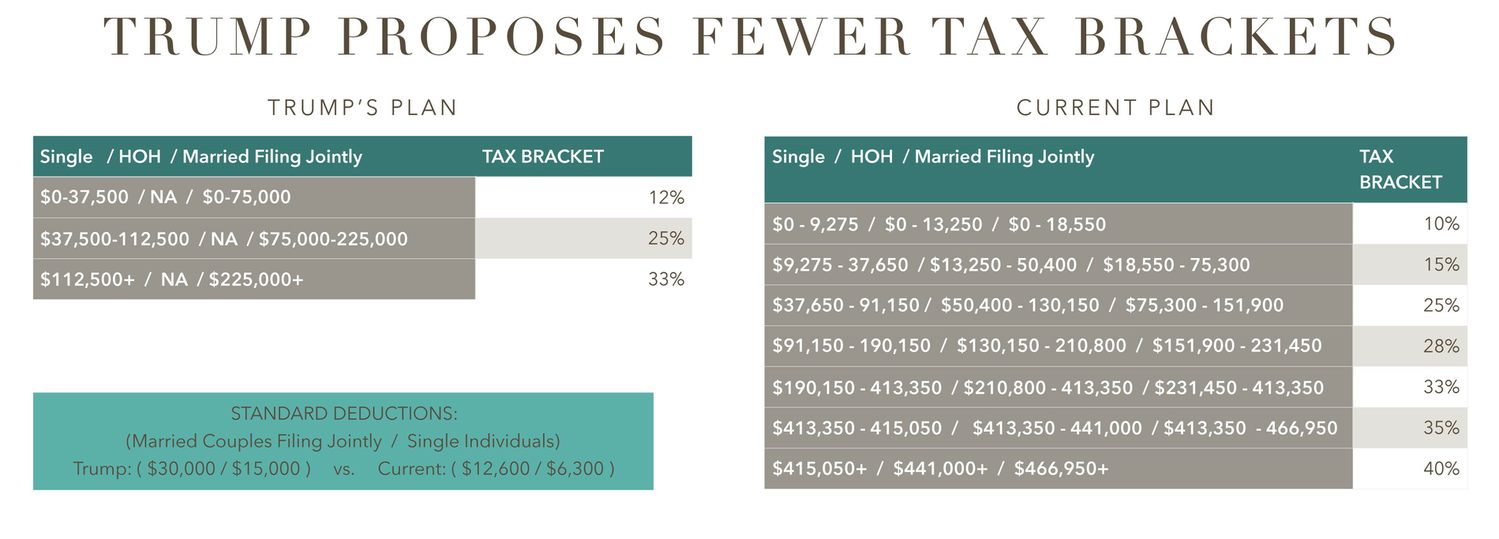A new presidency usually brings the promise and hope of a more efficient government, lower taxes and a simpler approach. With a new administration now in place, the pursuit of these ideals is in play. Trump’s proposals aim to simplify taxes by reducing the number of brackets from the current seven, to three. Some argue that this simplification may actually raise taxes for single filers, rather than lower them. The current brackets, which have been in place for some time, scale up from 10% to 40% over seven brackets, while Trump’s brackets scale up from 12% to 33% over three brackets.
Affecting almost all taxpayers is the standard deduction, which Trump proposes to raise from $12,600 currently for married couples to $30,000. For wage earners that are employees and not self-employed, the standard deduction can be the sole and largest deduction on tax returns. Although other deductions would most likely go away, this would be a big step forward in simplification of the tax code for a majority of Americans.
The tax exemption on municipal bond interest has been broached as a possible elimination and is a fairly contested subject. The loss of the municipal interest exemption could make municipal bonds less desirable, making it more difficult for local counties and state governments to raise capital. Hence, this has become a highly politically charged decision.
In addition to Trump’s tax proposals, the Republicans under the House plan have proposals of their own. The question is, on which proposals will the Trump and the House plan overlap and disagree.
Both plans propose doing away with AMT and the 3.8% Medicare surcharge on high income earners. The Medicare surcharge was essentially put in place to help subsidize the Affordable Care Act (ACA).
The elimination of itemized deductions is a mutual goal for both the House and Trump tax plans. The House plan would only retain two critical deductions: mortgage interest and charitable contributions. All other deductions would be eliminated, including the deduction for state and local income taxes, property tax, and sales tax. The Trump proposals would retain most of these deductions, but cap them at the $200,000 level.
Both the House and Trump plan would repeal the estate tax, which allows families to pass along assets to heirs free of estate tax. The current maximum estate tax rate is 40%.
Small business owners would benefit immensely from proposals presented by the House and Trump. The House plan would limit the tax rate for pass through entities, such as S-Corps to 25%, while the Trump plan proposes a rate of just 15%. The Tax Foundation estimates that about 95% of U.S. businesses in the United States are considered pass through such as S-Corps. A Trump proposal for a cut in the corporate tax rate would reduce the rate from 35% to 15%.


Max W. Smith, CFP®, CIMA® | Kent G. Forsey, CFP®
Sources: donaldtrump.com, taxpolicycenter.org, taxfoundation.org
© OneBlueWindow, LLC. Available for use only by authorized subscribers and where permissible as such. This content is not authorized for resale.

